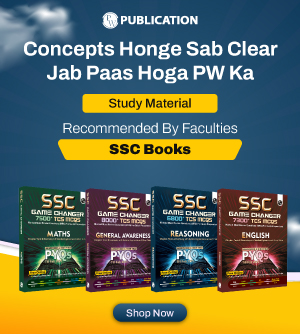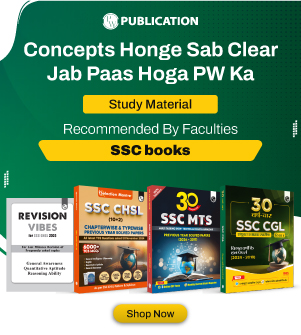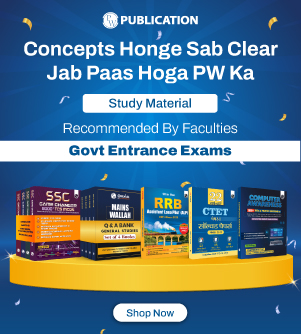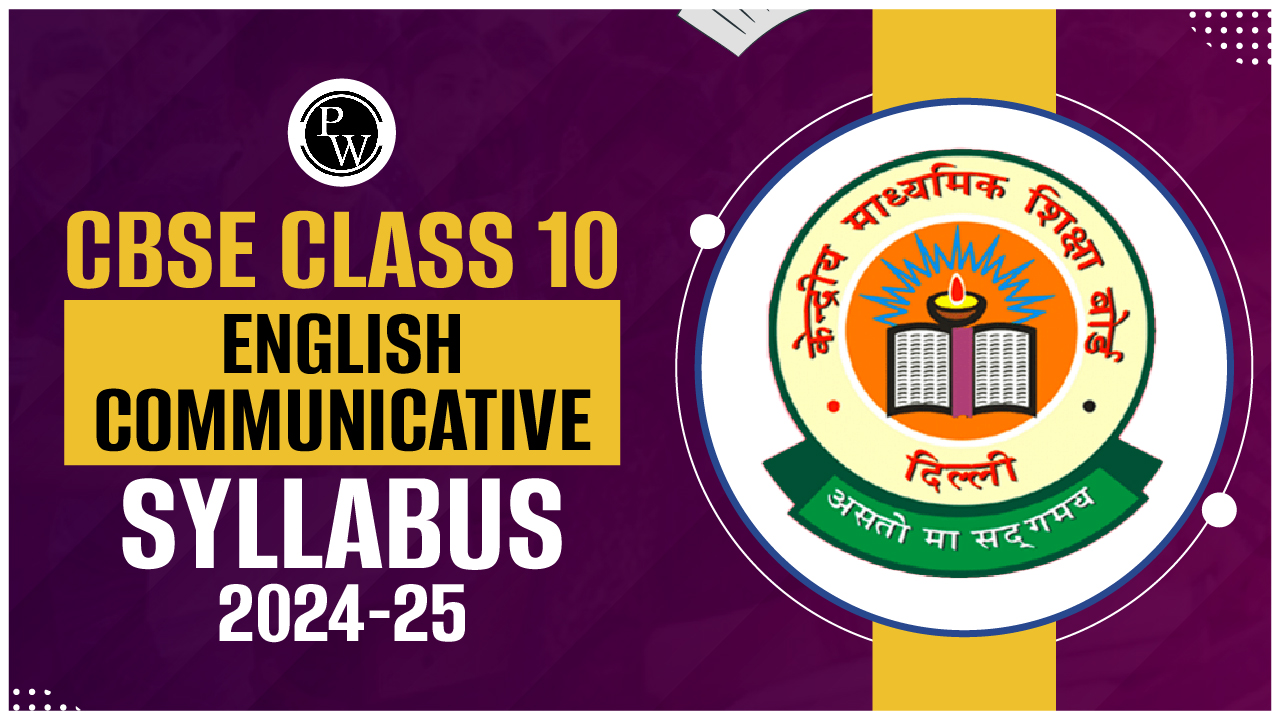Logical Reasoning Topics for Competitive Exams
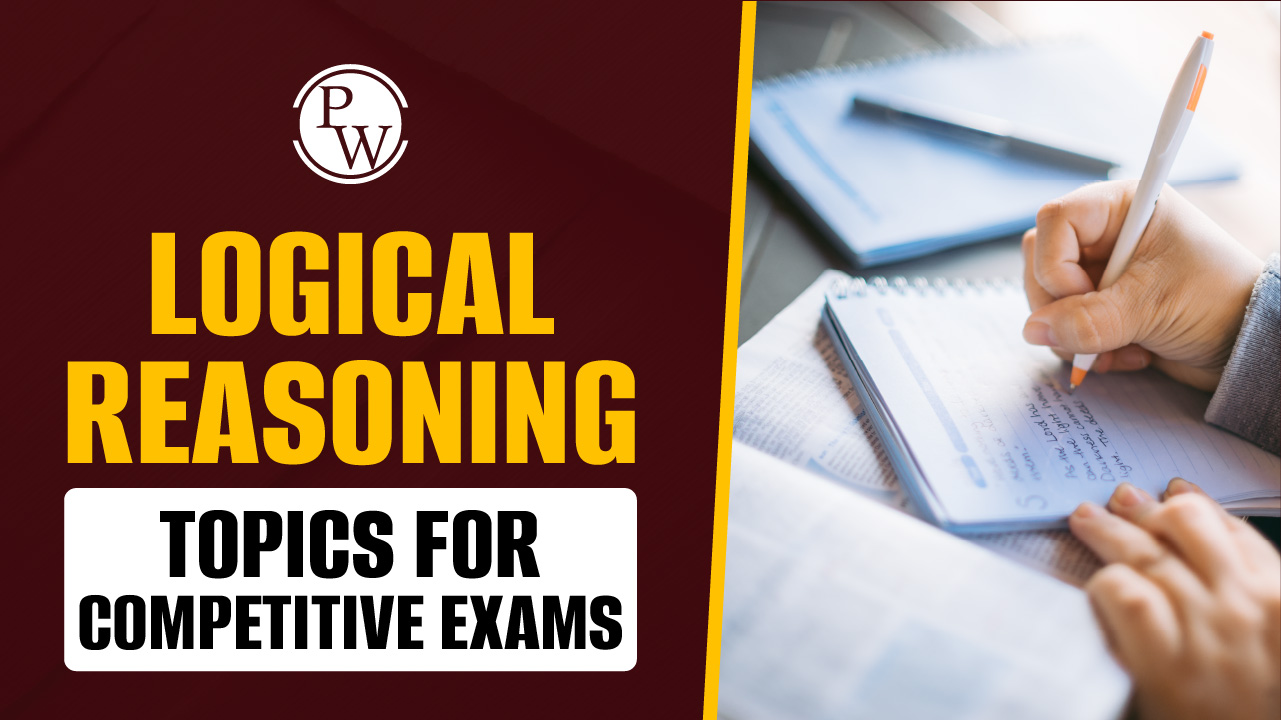
Logical reasoning plays a very important topic in almost every competitive exam in India. Whether you're preparing for SSC, Bank, UPSC, or any other government job test, questions from logical reasoning topics always appear. You can score very well in this section if you understand the reasoning topics list and follow the right approach. We will get a complete list of the logical reasoning syllabus, detailed explanations of important topics, and a simple method on how to solve logical reasoning questions.
Check Out: SSC Books
What Is Logical Reasoning?
Logical reasoning means using your brain to solve problems using logic and common sense. It checks how well you can analyze a situation, see patterns, and draw conclusions. It has nothing to do with memory. It’s all about understanding and thinking clearly. Most competitive exams include logical reasoning because it shows how candidates handle real-world problems. The questions might look different, but they all test the same basic thinking skills.
Logical Reasoning Topics
To help you prepare better, here is a reasoning topics list that most competitive exams follow. We have grouped them into three main categories:
Verbal Reasoning Topics
Verbal reasoning uses words and language to test your thinking skills. These logical reasoning topics appear in almost every competitive exam.
Core Verbal Areas:
-
Coding-Decoding is one of the most common reasoning topics. Here, letters or numbers follow a secret pattern. Your job is to crack the code.
-
For example, if CAT becomes DBU, each letter moves one step forward in the alphabet.
Blood Relations
-
Blood Relations questions ask about family connections. You might read "Ram’s father's brother's son" and need to identify this person's relationship with Ram.
-
Drawing a simple family tree helps solve these problems quickly.
Syllogism
-
Syllogism uses statements to test logical thinking. You get two or more statements and must decide which conclusions are correct.
-
For example, "All cats are animals. Some animals are pets." From this, you can conclude that some cats might be pets.
Direction Sense
-
Direction Sense problems involve movement and position. Someone walks north, then turns right, then walks again. You need to find their final position or direction.
-
These logical reasoning topics test your mental mapping skills.
Alphabet Series
-
You must find patterns in a sequence of letters.
-
Example: A, C, E, G... what comes next?
Word Formation & Dictionary Order
-
Create words from given letters or arrange words in dictionary order.
Statement and Assumptions / Conclusions / Arguments
-
Understand what is assumed, what can be concluded, or what is the strongest argument from a given statement.
Decision Making & Critical Reasoning
-
Pick the best action or conclusion from a given scenario.
-
These reasoning topics test practical wisdom along with logical thinking.
Check Out: Banking Books
Non-Verbal Reasoning Topics
Non-verbal reasoning uses pictures, shapes, and patterns instead of words. These logical reasoning topics are especially important for technical exams.
Visual Pattern Recognition:
-
Series and Patterns show you a sequence of shapes or figures with one missing. You must find the pattern and pick the next figure.
-
Common patterns include rotation, size changes, or element addition.
Analogy and Classification
-
Analogy questions work like "A is to B as C is to what?" but with pictures. If you see a square becoming a circle, then a triangle should become another curved shape.
Mirror and Water Images
-
Mirror and Water Images test how well you can imagine reflections.
-
A mirror image flips left and right, while a water image flips top and bottom.
Spatial Reasoning:
-
Cubes and Dice problems show different views of the same cube. You must figure out which numbers are on opposite faces or what the hidden sides look like.
Embedded Figures and Figure Matrix
-
Figure Matrix presents a grid of shapes with one missing. You need to find the pattern across rows and columns to complete the grid.
Check Out: Law Books
Analytical Reasoning Topics
Analytical reasoning combines logic with math and data analysis. These reasoning topics appear heavily in banking and management exams.
Data Sufficiency
-
Data Sufficiency questions ask whether you have enough information to solve a problem. You don't need to find the actual answer, just decide if it's possible with the given data.
Puzzles and Seating Arrangements
-
Puzzles and Arrangements are complex logical reasoning topics that involve placing people or objects according to specific rules.
-
Seating arrangement problems are the most common type.
Mathematical Reasoning
Mathematical Reasoning includes number series, inequalities, and time-based problems. These logical reasoning topics blend math skills with logical thinking.
Topic Weightage for Competitive Exams
Different exams focus on different topics. Here's a rough idea:
SSC (CGL, CHSL):
-
High focus: Coding-Decoding, Series, Non-Verbal Patterns
-
Medium focus: Syllogism, Puzzles, Blood Relations
Check Out: SSC Previous year Papers
Banking (IBPS, SBI):
-
High focus: Seating Arrangement, Puzzles, Inequality, Syllogism
-
Medium focus: Input-Output, Direction Sense
UPSC (CSAT):
-
High focus: Analytical Reasoning, Statement-based Questions
-
Medium focus: Number Series, Data Sufficiency
How to Solve Logical Reasoning Questions
Learning how to solve logical reasoning questions requires a systematic approach. Here's a proven method that works for all reasoning topics:
Step 1: Understand the Question Type
Before solving solutions, find which type of logical reasoning topic you're attending. Is it coding-decoding, blood relations, or series completion? Each type has its own solving method.
Read the question carefully without looking at the answer choices first. This prevents confusion and helps you focus on the actual problem.
Step 2: Collect and Organize Information
Collect all the facts given in the question. Write them down if needed. For complex reasoning topics like seating arrangements, organizing information is crucial.
-
Look for keywords that give important clues. Words like "immediately," "adjacent," or "opposite" carry specific meanings in logical reasoning questions.
Step 3: Apply the Right Technique
Each category of logical reasoning topics has specific solving tricks:
-
For Coding-Decoding: Look for simple patterns first. Check if letters move by the same number of positions. Use the alphabet position method (A=1, B=2, etc.) for quick calculations.
-
For Blood Relations: Draw a family tree with clear generations. Replace confusing names with simple relationships like "my father" or "my sister."
-
For Seating Arrangements: Start with the most restricted person or position. Process one condition at a time and mark impossible positions.
-
For Series Problems: Check for rotation patterns (90 degrees, 180 degrees). Count how many elements are added or removed between figures.
Step 4: Verify Your Answer
-
Always check if your solution fits all the given conditions. Many students make mistakes by forgetting to verify their answers against all constraints.
-
Use the elimination method to rule out obviously wrong options. This saves time and increases accuracy.
Read More: SSC Reasoning Syllabus 2025
Problem-Solving Strategies
Some problem-solving cheat codes for you to make your learning experience more fun and relaxed.
Pattern Recognition Tricks
For visual reasoning topics, develop a systematic scanning method. Always check these elements in order:
-
Shape changes (circle to square, etc.)
-
Size variations (big to small)
-
Position shifts (left to right, rotation)
-
Element addition or subtraction
-
Color or shading changes
Logical Deduction Techniques
When dealing with complex logical reasoning topics like puzzles:
-
Start with absolute facts (person X definitely sits here)
-
Use negative information (person Y doesn't sit next to Z)
-
Apply constraints systematically
-
Test possibilities when multiple options exist
Memory Aids
Create mental shortcuts for frequently used concepts:
-
Alphabet positions: Remember EJOTY (E=5, J=10, O=15, T=20, Y=25)
-
Direction movements: Use "Never Eat Soggy Waffles" (North, East, South, West clockwise)
-
Opposite relationships: A-Z, B-Y, C-X pattern for coding questions
Also Check, UPSC CSE Books
Building Long-term Success
Logical reasoning helps not only with exams but also with real-life situations. So practice it as much as possible.
1. Develop Logical Thinking
Beyond just practicing logical reasoning topics, work on improving your overall thinking skills. Solve puzzles, play strategy games, and read analytical content. This builds the mental foundation needed for all reasoning topics.
2. Stay Updated with Patterns
Exam patterns change over time. New types of logical reasoning questions appear regularly. Stay updated with recent exam trends and adjust your preparation accordingly.
3. Focus on Understanding, Not Memorization
While shortcuts help, understanding the logic behind reasoning topics is more important. This allows you to handle new question types that you haven't seen before.
4. Right Books for Logical Reasoning
Follow the right books that guide you and help you to practise much better with simple tricks.
Find the books below
|
Book Name |
Link |
|
SSC Reasoning Game Changer |
|
|
KYC Reasoning Ability Book |
|
|
CLAT Complete Logical Reasoning |
|
|
PW Banking Drona Logical and Analytical Reasoning |
Logical reasoning topics need consistent practice, smart study methods, and the right approach to how to solve logical reasoning questions. Try to focus on understanding patterns, developing speed, and building accuracy across all reasoning topics. Remember that different exams prioritize different parts of the logical reasoning syllabus. According to your preparation to match your target exam's requirements. With dedicated practice and the right strategy, you can excel in logical reasoning and boost your competitive exam scores significantly.
Logical Reasoning Topics FAQs
1. What are the most important logical reasoning topics for competitive exams?
The most important logical reasoning topics include coding-decoding, blood relations, syllogism, seating arrangements, series and patterns, and data sufficiency. These topics appear in almost every competitive exam and carry high weightage. Focus on mastering these core reasoning topics first before moving to advanced areas.
2. Which logical reasoning topics are most difficult for beginners?
Complex seating arrangements, input-output problems, and advanced puzzles are typically most challenging for beginners. These reasoning topics require multiple steps and careful organization of information. Start with simpler versions of these topics and gradually increase complexity as your skills improve.
3. What is the right way to practice logical reasoning topics at home?
Create a daily practice schedule covering different reasoning topics. Solve 20-30 questions daily, take weekly mock tests, and maintain an error log to track mistakes. Use online resources, practice books, and previous year papers to get variety in question types and difficulty levels.
4. How do I identify patterns in non-verbal reasoning series?
Look for systematic changes in these elements: shape transformations, size variations, position shifts, rotation patterns (90°, 180°), and element addition or subtraction. Check both forward and backward directions. Start with the most obvious changes first, then look for subtle patterns.
5. What's the difference between verbal and non-verbal reasoning topics?
Verbal reasoning topics use words, letters, and language-based logic (like coding-decoding, blood relations, syllogism). Non-verbal reasoning topics use figures, shapes, and visual patterns (like series completion, mirror images, cubes). Both test logical thinking but through different mediums.



